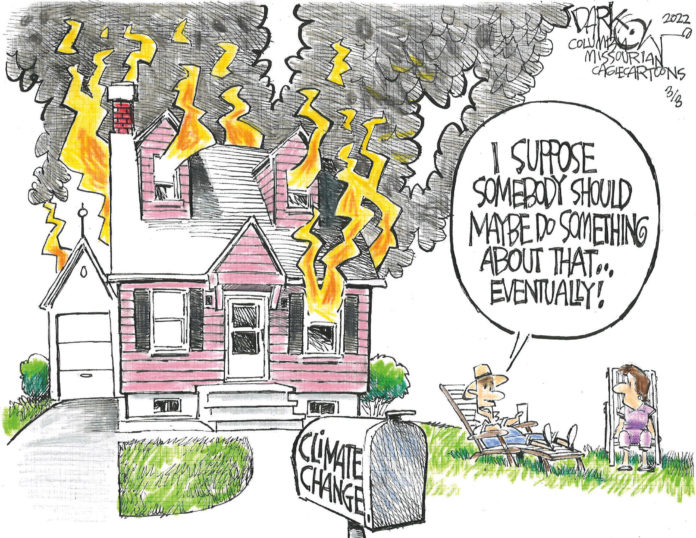Last December Huffington Post’s Sarah Ruiz-Grossman reported on a study in The Lancet Planetary Health journal that said, “Nearly 60% of young people surveyed said they were ‘very’ or ‘extremely’ worried about climate change, and 45% said their feelings about climate change negatively affected their daily life and functioning.”
Among the findings were, “nearly two-thirds of young people said their governments were not doing enough to avoid a climate catastrophe, and 58% felt governments were ‘betraying me and/or future generations.’”
Furthermore, “Three-quarters of young respondents said they believe ‘the future is frightening,’ and 56% felt ‘humanity is doomed.’”
Those with limited attention spans – similar to corporate and governmental leaders who quickly forget their climate-corrective promises – might have forgotten that Greta Thunberg’s activism to preserve Planet Eden began with her realization that school preparations for today’s world would be of little use in the degraded environment which short-sighted greedheads promise to inflict upon her generation.
Greta and her compeers represent a long-term point of view, a philosophy of life, diametrically opposed to the capitalistic economy as it has evolved over the past 50 years. Where it once concentrated on making and selling things, our economy’s main focus now is making money. Remember when corporate raiders were viewed as the scourges of American business? They would buy their ways into companies and immediately begin cutting jobs [and production] in the name of immediate profit. Make money now. Gut the company – and move on to the next victim. These profiteers have evolved from pariahs into prophets as their tactics became standard operating procedure in corporate America.
The concern with quarterly reports devolved into emphasis on monthly then weekly and finally daily balance sheets. And if you delay paying your own bills, those ledgers can appear even more robust.
It is this same short-timer approach that thwarts even good corporate intentions to reduce their profitable polluting ways. [And strategic “donations” to politicians can provide protection to their plundering pursuits.] They do not feel they can compete with other companies if they shift their focus from today to 30 years from now.
Of course, one could argue that young activists are just as selfish as their elders, that they are looking out for their own welfare 30 or 40 years down the line when many of today’s oppressors [and some of their own allies] will no longer strut upon the world stage. Still, when their goal is the welfare of the world – and not personal pecuniary profits – they do seem to be standing on the higher moral ground.
And the profiteers recognize the appeal of their message.
When Greta sailed carbon-free across the Atlantic for a United Nations conference, British Brexit-backer Aaron Banks observed, “Freak yachting accidents do happen in August.” He said he was only joking – about a 16-year-old girl drowning at sea.
Labour Party MP Tonia Antoniazzi put his remarks in context: “This is a man who funded Brexit lies, lives a life of excess and chooses to wish an accident on Greta Thunberg. It’s an absolute disgrace, his tweet should be reported as a hate crime.”
Similarly, when Brazilian Amazon activist Txai Suruí spoke at Glasgow, she was publicly criticized by Brazilian President Jair Bolsanaro for “attacking Brazil.” This led to more attacks on social media, including death threats, she told the BBC.
“I think I said the right words because they attacked me,” she said. But the murder of indigenous activists trying to protect Amazonia is no laughing matter. Such silence is often enforced with brutality.
With too many adults indolently indulging in consumerized complacency, it might fall to the youngsters to protect the only Earth we have. [There is no Planet B.]
The BBC also reported on Portuguese teenagers who have sued 33 European countries for violating their human rights for not acting upon their pledges to reduce harmful emissions. André Oliviera, his sister Sofia and their friends were spurred to action after “seeing the damage caused by wildfires in their home country.”
And a February report from the U.N. Environment Program predicted, “More wildfires will scorch the planet in coming decades and nations are not prepared,” according to the Huffington Post. Well, it is hard to be ready for the future when focused on the day’s closing bell.
Specifically, that story warns, “The likelihood of catastrophic wildfires globally could increase more than 50% by the turn of the century.”
Yes, the global-warming-fueled wildfires that plague this country are also results of massive adult indifference. But that does not have to be the case. Most large corporations and many smaller ones have research and development departments. It should be as much in their best interest as it is in ours to R&D plans to keep their companies from collapsing during a culture-killing climate catastrophe.
If they continue to choose profits over the planet, we should heed Greta’s original vision and rework our educational system to prepare today’s students for a future where their survival will depend more upon their own abilities to feed, clothe and shelter themselves. Those were skills all country people acquired in the late 19th and early 20th centuries. They could become fashionable again.








